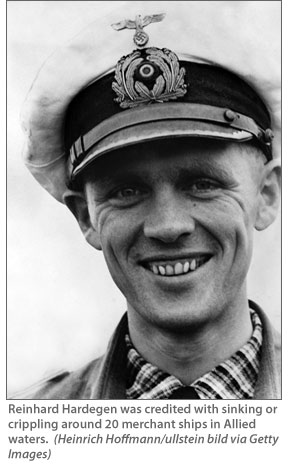The last surviving World War II German U-boat captain who left a dark mark along the Outer Banks during the Battle of the Atlantic has passed away at the age of 105.
Captain Reinhard Hardegen first arrived in East Coast waters shortly after the United States entered the war as part of a German mission, code-named Paukenschlag (Drumbeat), to attack oil tankers and freighters along the Eastern Seaboard before they could head to Europe. He took command of the U-123 in May of 1941, and was chosen for Drumbeat after a successful attack on ships off the coast of West Africa.
Captain Hardegen, commanding the U-123, sank two ships off the coast of Long Island in January 1942, as well as a Norwegian-manned oil tanker 150 miles off the coast of New York City, and the British oil tanker Coimbra about 100 miles from New York.
The sinking of the two vessels to the north made headlines, and Captain Hardegen soon moved south to the waters off of Cape Hatteras. Known as “Torpedo Junction” due to the U-boats that lingered in the local waters, and an estimated 50 to 60 ships that were destroyed within 100 miles, Captain Hardegen once told the Charlotte Observer that he was “very surprised” at the lack of maritime defenses in the region. “There was no defense on the coast of the United States. … No blackouts, no dimming, nothing.”
While off the coast of Cape Hatteras, his submarine sank three more vessels before he returned to his German home base in Lorient, France, completing his first patrol.
His second patrol lead to the destruction of the American oil tanker Gulfamerica off Jacksonville, Florida, but his U-boat suffered damage off St. Augustine by a destroyer’s depth charges, resulting in a rapid getaway.
It is estimated that Captain Hardegen sank about two dozen merchant ships during his two patrols along the East Coast, which propelled him to the rank of lieutenant commander.
Captain Hardegen left the German submarine service in May 1942, but he continued serving the German military until the end of the war. After Germany surrendered, he was arrested by the British, who mistakenly believed he was a member of the Nazi SS forces, and he was held for 16 months before it was confirmed he was a career Navy officer.
“I was not a Nazi,” Hardegen once told The Atlanta Journal-Constitution in a 1999 interview. “I did my duty for my country, not for Hitler.”
Returning to Bremen, Germany after the war, Hardegen eventually founded a marine oil company and was a longtime member of its Parliament.
Hardegen made a well-publicized return to the U.S. after the 1990s publication of the book “Operation Drumbeat ” by Historian Michael Gannon, saying he wanted to “show Americans that the enemies of yesterday are friends of today.”
In his book, Gannon also corroborated Hardegen’s log books which recorded approaching a lifeboat to give survivors food, and ordering a neutral Swiss ship to pick up the survivors of a sunken freighter. Captain Hardegen was also prominently featured in other literature about the Battle of the Atlantic, including the book “Torpedo Junction: U-Boat War Off America’s East Coast, 1942” by Homer Hickam.
Captain Hardegen passed away on June 9 in his hometown of Bremen, Germany.



